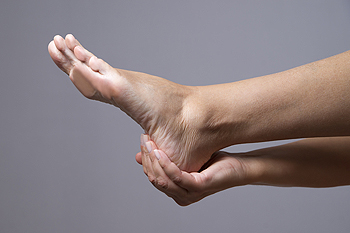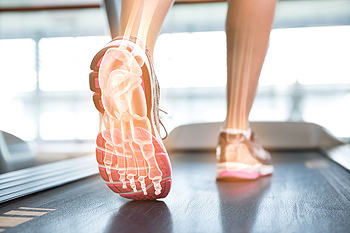Blog
Flat Feet, Babies, and Adults
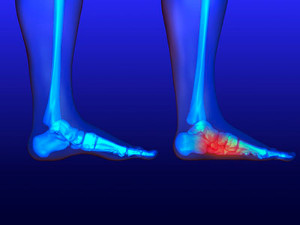 Fallen arches, which are known as flat feet, can affect pregnant women, people who are overweight, or patients who have an abnormal foot structure. There are some patients who can experience pain and discomfort as a result of flat feet. This may be a result of an inflamed tendon on the inside of the foot, or where the arch is normally located. The majority of babies are born with flat feet, and the arch typically develops by adulthood. There are stretches that can be performed which may help to bring mild relief, and this may eliminate the need for surgery. If you have flat feet, and would like information about specific shoes to wear or exercises to perform, please consult with a podiatrist.
Fallen arches, which are known as flat feet, can affect pregnant women, people who are overweight, or patients who have an abnormal foot structure. There are some patients who can experience pain and discomfort as a result of flat feet. This may be a result of an inflamed tendon on the inside of the foot, or where the arch is normally located. The majority of babies are born with flat feet, and the arch typically develops by adulthood. There are stretches that can be performed which may help to bring mild relief, and this may eliminate the need for surgery. If you have flat feet, and would like information about specific shoes to wear or exercises to perform, please consult with a podiatrist.
Flatfoot is a condition many people suffer from. If you have flat feet, contact Dr. Kevin Davis from Davis Foot & Ankle Centers. Our doctor will treat your foot and ankle needs.
What Are Flat Feet?
Flatfoot is a condition in which the arch of the foot is depressed and the sole of the foot is almost completely in contact with the ground. About 20-30% of the population generally has flat feet because their arches never formed during growth.
Conditions & Problems:
Having flat feet makes it difficult to run or walk because of the stress placed on the ankles.
Alignment – The general alignment of your legs can be disrupted, because the ankles move inward which can cause major discomfort.
Knees – If you have complications with your knees, flat feet can be a contributor to arthritis in that area.
Symptoms
- Pain around the heel or arch area
- Trouble standing on the tip toe
- Swelling around the inside of the ankle
- Flat look to one or both feet
- Having your shoes feel uneven when worn
Treatment
If you are experiencing pain and stress on the foot you may weaken the posterior tibial tendon, which runs around the inside of the ankle.
If you have any questions please feel free to contact our office located in Springfield, TN . We offer the newest diagnostic and treatment technologies for all your foot and ankle needs.
What Kind of Shoes Should My Child Wear?
Since many foot problems in children are due to ill-fitting or improper footwear, it’s important to make sure your child wears the right shoes. Check the fit on their shoes every 3-4 months to make sure they haven’t outgrown them. Avoid shoes that are too inflexible, tight, or hand-me-downs—all of which can change the shape of your child’s feet. Babies learning to walk should be barefoot indoors or have on soft-soled shoes to build up muscles and allow toes to grip the floor. Small children should wear non-synthetic, breathable shoes that are flexible and adjustable for a secure fit with a round toe box. Soles should be smooth and not overly grippy—which can alter a child’s gait and restrict their ability to move properly. If you notice any irregularities in the structure of your child’s foot or their gait, make an appointment with a podiatrist for a full examination.
Making sure that your children maintain good foot health is very important as they grow. If you have any questions, contact Dr. Kevin Davis of Davis Foot & Ankle Centers. Our doctor can provide the care you need to keep you pain-free and on your feet.
Keeping Children's Feet Healthy
Having healthy feet during childhood can help prevent medical problems later in life, namely in the back and legs. As children grow, their feet require different types of care. Here are some things to consider...
Although babies do not walk yet, it is still very important to take care of their feet.
Avoid putting tight shoes or socks on his or her feet.
Allow the baby to stretch and kick his or her feet to feel comfortable.
As a toddler, kids are now on the move and begin to develop differently. At this age, toddlers are getting a feel for walking, so don’t be alarmed if your toddler is unsteady or ‘walks funny’.
As your child gets older, it is important to teach them how to take care of their feet.
Show them proper hygiene to prevent infections such as fungus.
Be watchful for any pain or injury.
Have all injuries checked by a doctor as soon as possible.
Comfortable, protective shoes should always be worn, especially at play.
If you have any questions please feel free to contact our office located in Springfield, TN . We offer the newest diagnostic and treatment technologies for all your foot and ankle needs.
All About Athlete's Foot
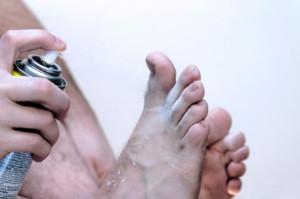 Athlete’s foot is a fungal infection of the skin on the feet. It can cause symptoms such as skin redness, scaling, peeling, or flaking, as well as itching, stinging, and burning on the feet. Athlete’s foot can affect any part of the foot, but is usually found on the soles of the feet, in between the toes, or on the toenails. Mild athlete’s foot can be treated through over-the-counter topical creams, sprays, or powders. More severe infections may require prescription topical or oral medications. Athlete’s foot is considered to be highly contagious and can spread from person to person or it can even spread from your feet to other parts of your body. If you have athlete’s foot it is suggested that you see a podiatrist for proper treatment.
Athlete’s foot is a fungal infection of the skin on the feet. It can cause symptoms such as skin redness, scaling, peeling, or flaking, as well as itching, stinging, and burning on the feet. Athlete’s foot can affect any part of the foot, but is usually found on the soles of the feet, in between the toes, or on the toenails. Mild athlete’s foot can be treated through over-the-counter topical creams, sprays, or powders. More severe infections may require prescription topical or oral medications. Athlete’s foot is considered to be highly contagious and can spread from person to person or it can even spread from your feet to other parts of your body. If you have athlete’s foot it is suggested that you see a podiatrist for proper treatment.
Athlete’s foot is an inconvenient condition that can be easily reduced with the proper treatment. If you have any concerns about your feet and ankles, contact Dr. Kevin Davis from Davis Foot & Ankle Centers. Our doctor will treat your foot and ankle needs.
Athlete’s Foot: The Sole Story
Athlete's foot, also known as tinea pedis, can be an extremely contagious foot infection. It is commonly contracted in public changing areas and bathrooms, dormitory style living quarters, around locker rooms and public swimming pools, or anywhere your feet often come into contact with other people.
Solutions to Combat Athlete’s Foot
- Hydrate your feet by using lotion
- Exfoliate
- Buff off nails
- Use of anti-fungal products
- Examine your feet and visit your doctor if any suspicious blisters or cuts develop
Athlete’s foot can cause many irritating symptoms such as dry and flaking skin, itching, and redness. Some more severe symptoms can include bleeding and cracked skin, intense itching and burning, and even pain when walking. In the worst cases, Athlete’s foot can cause blistering as well. Speak to your podiatrist for a better understanding of the different causes of Athlete’s foot, as well as help in determining which treatment options are best for you.
If you have any questions please feel free to contact our office located in Springfield, TN . We offer the newest diagnostic and treatment technologies for all your foot and ankle needs.
Causes of Hammertoe
 Weakened muscles in the toe may cause the tendons to become shorter, enabling the middle joint in the toes to protrude. There may be several causes of this particular condition, referred to as hammertoe, including an inherited predisposition. Symptoms may include experiencing difficulty in walking or not being able to flex and point your toes. Wearing proper footwear is important, especially keeping the heels to 2 inches or less. If the toes are not able to stretch, surgery may be an option. A consultation with a podiatrist is recommended for a proper diagnosis and the best treatment options.
Weakened muscles in the toe may cause the tendons to become shorter, enabling the middle joint in the toes to protrude. There may be several causes of this particular condition, referred to as hammertoe, including an inherited predisposition. Symptoms may include experiencing difficulty in walking or not being able to flex and point your toes. Wearing proper footwear is important, especially keeping the heels to 2 inches or less. If the toes are not able to stretch, surgery may be an option. A consultation with a podiatrist is recommended for a proper diagnosis and the best treatment options.
Hammertoe
Hammertoes can be a painful condition to live with. For more information, contact Dr. Kevin Davis from Davis Foot & Ankle Centers. Our doctor will answer any of your foot- and ankle-related questions.
Hammertoe is a foot deformity that affects the joints of the second, third, fourth, or fifth toes of your feet. It is a painful foot condition in which these toes curl and arch up, which can often lead to pain when wearing footwear.
Symptoms
- Pain in the affected toes
- Development of corns or calluses due to friction
- Inflammation
- Redness
- Contracture of the toes
Causes
Genetics – People who are genetically predisposed to hammertoe are often more susceptible
Arthritis – Because arthritis affects the joints in your toes, further deformities stemming from arthritis can occur
Trauma – Direct trauma to the toes could potentially lead to hammertoe
Ill-fitting shoes – Undue pressure on the front of the toes from ill-fitting shoes can potentially lead to the development of hammertoe
Treatment
Orthotics – Custom made inserts can be used to help relieve pressure placed on the toes and therefore relieve some of the pain associated with it
Medications – Oral medications such as anti-inflammatories or NSAIDs could be used to treat the pain and inflammation hammertoes causes. Injections of corticosteroids are also sometimes used
Surgery – In more severe cases where the hammertoes have become more rigid, foot surgery is a potential option
If you have any questions please contact our office located in Springfield, TN . We offer the newest diagnostic and treatment technologies for all your foot and ankle needs.
Treatments for Ingrown Toenails
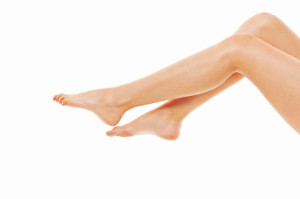 If you realize your toenail is growing into the surrounding skin in addition to becoming red and tender, the chances are good that you are experiencing an ingrown toenail. Usually the big toe is affected and may bleed or have pus coming from the area. Common causes may be from injuries such as a stubbed toe, poorly cut toenails, or from shoes that may not fit correctly. Proper treatment is crucial for ingrown toenails in order to prevent infection. This may include changing socks regularly, cutting the nail straight across to prevent digging into the skin that surrounds it, and keeping the feet clean by washing them every day. Minor surgery for severe cases may include a partial or total nail avulsion. Typically, this means a local anaesthetic is used for numbing the toe, and the edges of the toenail may be cut away or the nail fully removed. If you think you may have ingrown toenails, a consultation with a podiatrist is advised for a proper diagnosis and treatment.
If you realize your toenail is growing into the surrounding skin in addition to becoming red and tender, the chances are good that you are experiencing an ingrown toenail. Usually the big toe is affected and may bleed or have pus coming from the area. Common causes may be from injuries such as a stubbed toe, poorly cut toenails, or from shoes that may not fit correctly. Proper treatment is crucial for ingrown toenails in order to prevent infection. This may include changing socks regularly, cutting the nail straight across to prevent digging into the skin that surrounds it, and keeping the feet clean by washing them every day. Minor surgery for severe cases may include a partial or total nail avulsion. Typically, this means a local anaesthetic is used for numbing the toe, and the edges of the toenail may be cut away or the nail fully removed. If you think you may have ingrown toenails, a consultation with a podiatrist is advised for a proper diagnosis and treatment.
Ingrown toenails can become painful if they are not treated properly. For more information about ingrown toenails, contact Dr. Kevin Davis of Davis Foot & Ankle Centers. Our doctor can provide the care you need to keep you pain-free and on your feet.
Ingrown Toenails
Ingrown toenails occur when a toenail grows sideways into the bed of the nail, causing pain, swelling, and possibly infection.
Causes
- Bacterial infections
- Improper nail cutting such as cutting it too short or not straight across
- Trauma to the toe, such as stubbing, which causes the nail to grow back irregularly
- Ill-fitting shoes that bunch the toes too close together
- Genetic predisposition
Prevention
Because ingrown toenails are not something found outside of shoe-wearing cultures, going barefoot as often as possible will decrease the likeliness of developing ingrown toenails. Wearing proper fitting shoes and using proper cutting techniques will also help decrease your risk of developing ingrown toenails.
Treatment
Ingrown toenails are a very treatable foot condition. In minor cases, soaking the affected area in salt or antibacterial soaps will not only help with the ingrown nail itself, but also help prevent any infections from occurring. In more severe cases, surgery is an option. In either case, speaking to your podiatrist about this condition will help you get a better understanding of specific treatment options that are right for you.
If you have any questions please feel free to contact our office located in Springfield, TN . We offer the newest diagnostic and treatment technologies for all your foot and ankle needs.
All About Plantar Fasciitis
Plantar fasciitis affects more than three million people each year. This ailment typically occurs when the foot’s shock absorbing ligament, also known as the plantar fascia, suffers inflammation or small tears from too much tension or stress. The ligament associated with plantar fasciitis runs across the entire bottom of the foot. However, the pain associated with this condition is usually only located within the center of the heel. Some people do tend to experience pain up into their arch, though. Plantar fasciitis can be caused by a variety of occurrences such as jobs that keep people on their feet, stressful exercises, obesity, or wearing shoes with little support. Treatments for plantar fasciitis may include icing your feet, receiving cortisone injections, wearing a specialized boot, and even doing stretches. If you are experiencing any foot pain, an appointment with your podiatrist is highly advised.
Plantar fasciitis can be very painful and inconvenient. If you are experiencing heel pain or symptoms of plantar fasciitis, contact Dr. Kevin Davis from Davis Foot & Ankle Centers. Our doctor can provide the care you need to keep you pain-free and on your feet.
What Is Plantar Fasciitis?
Plantar fasciitis is the inflammation of the thick band of tissue that runs along the bottom of your foot, known as the plantar fascia, and causes mild to severe heel pain.
What Causes Plantar Fasciitis?
- Excessive running
- Non-supportive shoes
- Overpronation
- Repeated stretching and tearing of the plantar fascia
How Can It Be Treated?
- Conservative measures – anti-inflammatories, ice packs, stretching exercises, physical therapy, orthotic devices
- Shockwave therapy – sound waves are sent to the affected area to facilitate healing and are usually used for chronic cases of plantar fasciitis
- Surgery – usually only used as a last resort when all else fails. The plantar fascia can be surgically detached from the heel
While very treatable, plantar fasciitis is definitely not something that should be ignored. Especially in severe cases, speaking to your doctor right away is highly recommended to avoid complications and severe heel pain. Your podiatrist can work with you to provide the appropriate treatment options tailored to your condition.
If you have any questions please feel free to contact our office located in Springfield, TN . We offer the newest diagnostic and treatment technologies for all your foot and ankle needs.
A Diabetic’s Guide to Proper Foot Care
 Foot problems may become more severe if you are a diabetic, and additional care must be taken to avoid complications. There are several techniques that can be practiced for optimum foot care, including checking the feet daily for any cuts or redness, cutting the toenails correctly, and washing and drying thoroughly between the toes. If the skin becomes hardened, you may consider applying a moisturizer on the top and bottom of the feet which will promote softer skin. Choosing to wear shoes that fit well will not only feel comfortable, but will be beneficial in avoiding conditions that may lead to sores and infections. When buying shoes, it’s important to make sure the toes have adequate room to move around, and choosing a shoe with a lower heel may be helpful to avoid falling. It is of vital importance that daily foot inspections be carried out. Any type of wound, especially one that is not healing, must be addressed with immediate attention. A consultation with a podiatrist is advised to learn about the importance of proper diabetic foot care.
Foot problems may become more severe if you are a diabetic, and additional care must be taken to avoid complications. There are several techniques that can be practiced for optimum foot care, including checking the feet daily for any cuts or redness, cutting the toenails correctly, and washing and drying thoroughly between the toes. If the skin becomes hardened, you may consider applying a moisturizer on the top and bottom of the feet which will promote softer skin. Choosing to wear shoes that fit well will not only feel comfortable, but will be beneficial in avoiding conditions that may lead to sores and infections. When buying shoes, it’s important to make sure the toes have adequate room to move around, and choosing a shoe with a lower heel may be helpful to avoid falling. It is of vital importance that daily foot inspections be carried out. Any type of wound, especially one that is not healing, must be addressed with immediate attention. A consultation with a podiatrist is advised to learn about the importance of proper diabetic foot care.
Diabetic foot care is important in preventing foot ailments such as ulcers. If you are suffering from diabetes or have any other concerns about your feet, contact Dr. Kevin Davis from Davis Foot & Ankle Centers. Our doctor can provide the care you need to keep you pain-free and on your feet.
Diabetic Foot Care
Diabetes affects millions of people every year. The condition can damage blood vessels in many parts of the body, especially the feet. Because of this, taking care of your feet is essential if you have diabetes, and having a podiatrist help monitor your foot health is highly recommended.
The Importance of Caring for Your Feet
- Routinely inspect your feet for bruises or sores.
- Wear socks that fit your feet comfortably.
- Wear comfortable shoes that provide adequate support.
Patients with diabetes should have their doctor monitor their blood levels, as blood sugar levels play such a huge role in diabetic care. Monitoring these levels on a regular basis is highly advised.
It is always best to inform your healthcare professional of any concerns you may have regarding your feet, especially for diabetic patients. Early treatment and routine foot examinations are keys to maintaining proper health, especially because severe complications can arise if proper treatment is not applied.
If you have any questions please feel free to contact our office located in Springfield, TN . We offer the newest diagnostic and treatment technologies for all your foot and ankle needs.
Causes and Symptoms of Achilles Tendon Injuries
 The Achilles tendon connects the calf muscles to the heel. When this tendon is injured, immediate attention is necessary to encourage proper healing. This injury typically occurs while participating in a sport involving running or jumping and may initially be felt due to a sharp pain in the back of the heel. Symptoms of this condition may include the inability to point and flex the foot, limping, and experiencing significant swelling and pain. Treatment may consist of applying ice packs to the affected area, and it’s advised to seek medical attention as soon as possible. Occasionally, the leg is put into a cast for proper healing. For severe tears to the Achilles tendon, surgery and a rehabilitation program may be necessary for a complete recovery.
The Achilles tendon connects the calf muscles to the heel. When this tendon is injured, immediate attention is necessary to encourage proper healing. This injury typically occurs while participating in a sport involving running or jumping and may initially be felt due to a sharp pain in the back of the heel. Symptoms of this condition may include the inability to point and flex the foot, limping, and experiencing significant swelling and pain. Treatment may consist of applying ice packs to the affected area, and it’s advised to seek medical attention as soon as possible. Occasionally, the leg is put into a cast for proper healing. For severe tears to the Achilles tendon, surgery and a rehabilitation program may be necessary for a complete recovery.
Achilles tendon injuries need immediate attention to avoid future complications. If you have any concerns, contact Dr. Kevin Davis of Davis Foot & Ankle Centers. Our doctor can provide the care you need to keep you pain-free and on your feet.
What Is the Achilles Tendon?
The Achilles tendon is a tendon that connects the lower leg muscles and calf to the heel of the foot. It is the strongest tendon in the human body and is essential for making movement possible. Because this tendon is such an integral part of the body, any injuries to it can create immense difficulties and should immediately be presented to a doctor.
What Are the Symptoms of an Achilles Tendon Injury?
There are various types of injuries that can affect the Achilles tendon. The two most common injuries are Achilles tendinitis and ruptures of the tendon.
Achilles Tendinitis Symptoms
- Inflammation
- Dull to severe pain
- Increased blood flow to the tendon
- Thickening of the tendon
Rupture Symptoms
- Extreme pain and swelling in the foot
- Total immobility
Treatment and Prevention
Achilles tendon injuries are diagnosed by a thorough physical evaluation, which can include an MRI. Treatment involves rest, physical therapy, and in some cases, surgery. However, various preventative measures can be taken to avoid these injuries, such as:
- Thorough stretching of the tendon before and after exercise
- Strengthening exercises like calf raises, squats, leg curls, leg extensions, leg raises, lunges, and leg presses
If you have any questions please feel free to contact our office located in Springfield, TN . We offer the newest diagnostic tools and technology to treat your foot and ankle needs.
The Importance of Having Strong Feet
The feet are often considered the foundation of the body. There are numerous benefits to having strong feet, and this can be encouraged by performing proper foot exercises. Additionally, flexibility can be attained by exercising the feet, and this may positively affect balance and support of the body’s weight. There are simple ways to accomplish this, and several of these stretching exercises involve the use of a towel. When the calves are stretched, the benefits extend to the ankles and feet, which can improve circulation. While seated, fully extend the leg, wrap the towel around the sole of the foot, and gently pull forward. Typically, you’ll feel moderate tension, and it’s beneficial to hold this position for 30 seconds. These stretches not only feel good, but will strengthen the muscles and tendons in the feet. Please consider scheduling a consultation with a podiatrist to learn more about the benefits of exercising the feet.
Exercising your feet regularly with the proper foot wear is a great way to prevent injuries and build strength. If you have any concerns about your feet, contact Dr. Kevin Davis from Davis Foot & Ankle Centers. Our doctor can provide the care you need to keep you pain-free and on your feet.
Exercise for Your Feet
Exercise for your feet can help you gain strength, mobility and flexibility in your feet. They say that strengthening your feet can be just as rewarding as strengthening another part of the body. Your feet are very important, and we often forget about them in our daily tasks. But it is because of our feet that are we able to get going and do what we need to. For those of us fortunate enough to not have any foot problems, it is an important gesture to take care of them to ensure good health in the long run.
Some foot health exercises can include ankle pumps, tip-toeing, toe rises, lifting off the floor doing reps and sets, and flexing the toes. It is best to speak with Our doctor to determine an appropriate regimen for your needs. Everyone’s needs and bodies are different, and the activities required to maintain strength in the feet vary from individual to individual.
Once you get into a routine of doing regular exercise, you may notice a difference in your feet and how strong they may become.
If you have any questions please feel free to contact our office located in Springfield, TN . We offer the newest diagnostic and treatment technologies for all your foot and ankle needs.
How Do High Heels Affect My Feet?
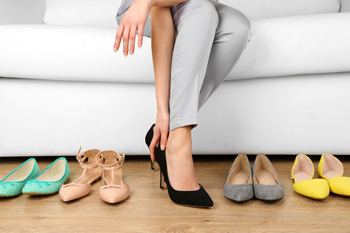 Permanent damage to your feet may be a result of wearing high heels frequently and throughout the day. There are several parts of the feet that may suffer afflictions, starting with the toes. You may see a deformity that may gradually develop, due to the feet being in an environment that’s too small. Additionally, calf muscles may shorten because the stride is not as long as it would be with flatter shoes. Hammertoes, bunions, or sprained ankles are among the many ailments that can develop from wearing high heels daily, and if severe enough, may require surgery. If you do choose to wear high heels, try to limit the length of the heel and select a shoe with a wide area for the toes.
Permanent damage to your feet may be a result of wearing high heels frequently and throughout the day. There are several parts of the feet that may suffer afflictions, starting with the toes. You may see a deformity that may gradually develop, due to the feet being in an environment that’s too small. Additionally, calf muscles may shorten because the stride is not as long as it would be with flatter shoes. Hammertoes, bunions, or sprained ankles are among the many ailments that can develop from wearing high heels daily, and if severe enough, may require surgery. If you do choose to wear high heels, try to limit the length of the heel and select a shoe with a wide area for the toes.
High heels have a history of causing foot and ankle problems. If you have any concerns about your feet or ankles, contact Dr. Kevin Davis from Davis Foot & Ankle Centers. Our doctor can provide the care you need to keep you pain-free and on your feet.
Effects of High Heels on the Feet
High heels are popular shoes among women because of their many styles and societal appeal. Despite this, high heels can still cause many health problems if worn too frequently.
Which Parts of My Body Will Be Affected by High Heels?
- Ankle Joints
- Achilles Tendon – May shorten and stiffen with prolonged wear
- Balls of the Feet
- Knees – Heels cause the knees to bend constantly, creating stress on them
- Back – They decrease the spine’s ability to absorb shock, which may lead to back pain. The vertebrae of the lower back may compress.
What Kinds of Foot Problems Can Develop from Wearing High Heels?
- Corns
- Calluses
- Hammertoe
- Bunions
- Morton’s Neuroma
- Plantar Fasciitis
How Can I Still Wear High Heels and Maintain Foot Health?
If you want to wear high heeled shoes, make sure that you are not wearing them every day, as this will help prevent long term physical problems. Try wearing thicker heels as opposed to stilettos to distribute weight more evenly across the feet. Always make sure you are wearing the proper shoes for the right occasion, such as sneakers for exercising. If you walk to work, try carrying your heels with you and changing into them once you arrive at work. Adding inserts to your heels can help cushion your feet and absorb shock. Full foot inserts or metatarsal pads are available.
If you have any questions please feel free to contact our office located in Springfield, TN . We offer the newest diagnostic and treatment technologies for all your foot and ankle needs.

